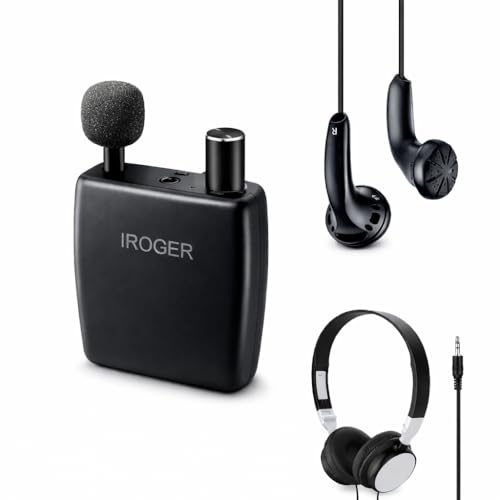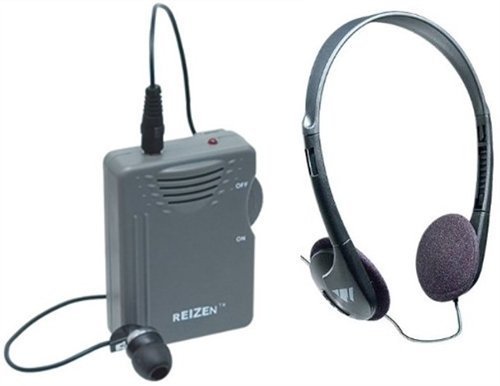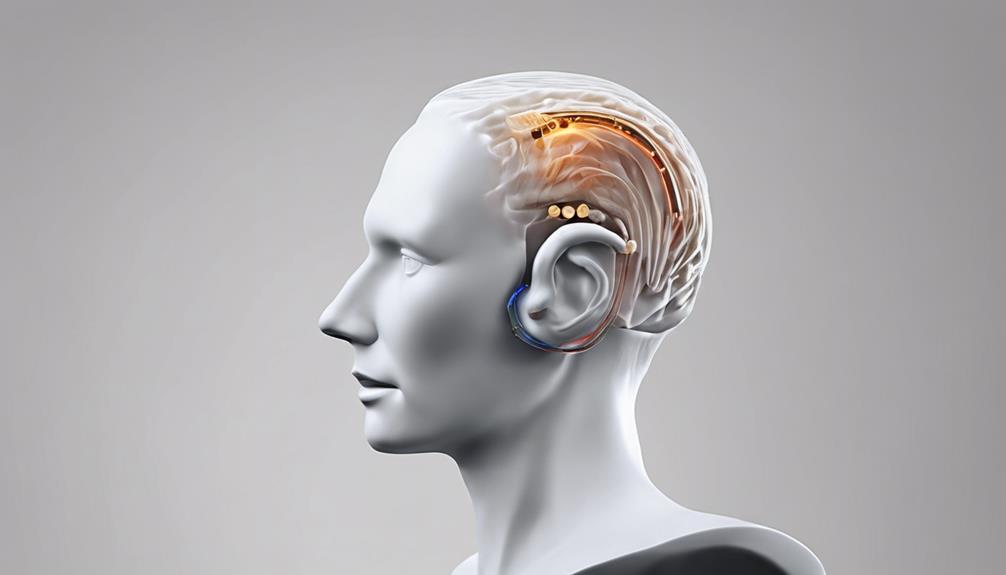When it comes to hearing loss, the signs can be subtle yet important. You might find it challenging to follow conversations or miss important sounds in your daily environment. Understanding the nuances of hearing loss and recognizing when it’s necessary to seek assistance is crucial for maintaining a high quality of life.
However, beyond just recognizing the signs, knowing when to take the next step towards considering hearing aids is an essential part of the journey to better hearing.
Key Takeaways
- Signs of hearing loss include asking for repetitions and struggling in noisy environments.
- Types of hearing loss vary, including sensorineural and age-related.
- Consider hearing aids if facing challenges in understanding conversations.
- Factors to consider when choosing hearing aids include shape, noise reduction, and connectivity options.

IROGER Hearing Amplifier for Seniors, Personal Sound Amplifier, Smart Auto-Gain, Directional Microphone, Rechargeable with 120-Hour Battery, Headphones & Earbuds Included
Smart Auto-Gain Control – Enjoy crystal-clear sound at all times. iRoger automatically balances audio levels to enhance voices...
As an affiliate, we earn on qualifying purchases.
Signs of Hearing Loss
If you find yourself frequently asking others to repeat themselves or clarify during conversations, this could be a significant indicator of potential hearing loss. Struggling to follow conversations, especially in noisy environments, or feeling the need to increase the volume on devices for better understanding are common signs of hearing impairment.
Avoiding social gatherings due to difficulties in hearing and communication may also suggest the need for hearing aids. If friends or family members express concerns about your hearing abilities or if you experience frequent repetition in conversations, it's advisable to seek professional help.
Difficulty in noisy environments and overall communication challenges can significantly impact your quality of life. Recognizing these signs early on and taking proactive steps to address them by consulting with a hearing healthcare professional can lead to improved hearing and overall well-being.

Joanbro Personal Sound Amplifier for Seniors, Voice Enhancement Devices, Pocket Sound Amplifiers for Elderly People, Adults, 50dB Gain, with Headphones & Earbud, 3 Types Mics, 3 Tone, Volume Control
SUPERIOR PERSONAL SOUND AMPLIFIER: Applying noise cancelling, automatic gain control and advanced amplifying circuit, this sound amplifier device...
As an affiliate, we earn on qualifying purchases.
Types of Hearing Loss

Moving on from the signs of hearing loss, understanding the different types of hearing loss is essential for recognizing and addressing specific issues related to auditory impairment. Sensorineural hearing loss, resulting from damage to inner ear structures like the cochlea and auditory nerve, is commonly categorized by the degree of hearing loss, ranging from mild to profound based on decibel ranges and impact on hearing abilities.
Age-related hearing loss is a prevalent form of sensorineural hearing loss that affects many individuals as they grow older. On the other hand, conductive hearing loss involves issues in the outer or middle ear and is distinct from sensorineural hearing loss, which pertains to inner ear damage.
Various factors contribute to hearing loss, including exposure to loud noise, aging, diseases, infections, trauma, and injury. Understanding these distinctions can aid in determining the appropriate interventions for individuals experiencing auditory challenges.

SuperEar Model SE5000 (PSAP) for Seniors - Hearing Amplifiers for Seniors, Super Ear Personal Sound Amplifier, Sound Amplifier Listening Device and Audio Accessories in 50dB Ambient Sounds Increase
COMPATIBILITY: Response to sound amplification is completely dependent on an individual's unique ability to detect sounds. For this...
As an affiliate, we earn on qualifying purchases.
Diagnosis of Hearing Loss
How is hearing loss diagnosed and what're the key steps involved in the diagnostic process?
Diagnosis of hearing loss begins with a thorough review of the individual's medical history and lifestyle factors to identify potential causes. Utilizing video-otoscopy, healthcare professionals can examine the ear canal and eardrum for any abnormalities or obstructions that may be contributing to hearing issues. Speech tests, including speech-in-noise assessments, are essential to evaluate the person's ability to comprehend speech in various environments.
Audiometric tests, such as pure tone and speech audiometry, play a crucial role in accurately measuring the type and severity of hearing loss. These diagnostic evaluations help determine the most suitable treatment options, including the consideration of hearing aids. Identifying the specific nature and extent of hearing loss through these tests is pivotal in providing effective interventions tailored to the individual's needs.

Elite Package: Reizen Loud Ear 120dB Gain Personal Amplifier
Powerful personal amplifier with 120dB gain
As an affiliate, we earn on qualifying purchases.
When to Consider Hearing Aids

Considering the challenges of understanding conversations in noisy environments, evaluating the need for hearing aids becomes crucial for individuals experiencing discomfort or avoidance in social settings. Signs of hearing loss, such as difficulty understanding conversations, avoiding crowded places, or feeling discomfort in social situations, may indicate the necessity for hearing aids.
If you frequently find yourself listening to the TV or music at higher volumes than others, it could be a red flag for potential hearing issues. Moderate hearing loss, characterized by a struggle with communication in everyday situations, is a clear indicator that hearing aids should be considered.
Seeking professional advice and undergoing a thorough hearing evaluation are essential steps to determine if hearing aids are the right solution for your specific hearing needs. By addressing these signs and seeking timely help, you can improve your quality of life and enhance your communication abilities in various social settings.
Choosing the Right Hearing Aid
When selecting the most suitable hearing aid, it's essential to consider the customization levels and features that best cater to your specific hearing needs. Here are some key factors to keep in mind:
- Evaluate the shape of the aid (in-the-ear or behind-the-ear) to determine the most suitable option.
- Consider the level of noise reduction offered by the hearing aid to improve your listening experience.
- Check the connectivity options of the hearing aid to ensure it meets your lifestyle and tech needs.
- Look for strong customer support services for setup, troubleshooting, and overall satisfaction.
- Verify the return policy of the provider to ensure you have the flexibility to make adjustments if needed.
Frequently Asked Questions
How Do I Know if I Really Need a Hearing Aid?
We can tell if we need a hearing aid by paying attention to signs like:
- Difficulty understanding conversations in noisy places
- Missing soft sounds or parts of speech
- Feeling isolated due to communication challenges
- Asking for repeats often
- Struggling in noisy settings
These indicators suggest a potential hearing loss that might require evaluation for a hearing aid to improve our hearing and quality of life.
What Is a Comprehensive Hearing Exam?
When we talk about a comprehensive hearing exam, we're referring to a thorough assessment that involves a detailed medical history, lifestyle evaluation, and examination of the ear canal.
Tests like video-otoscopy allow visual inspection of the ear to check for any issues.
Speech tests help assess speech understanding in various environments.
Audiometric evaluations measure hearing sensitivity to pinpoint the type and extent of hearing loss.
This information is crucial in determining appropriate treatment, including the potential need for hearing aids.
At What Point of Hearing Loss Do You Need Hearing Aids?
When hearing loss progresses to a point where conversations become challenging, and everyday sounds are harder to hear, it may be time to consider hearing aids.
Social withdrawal due to difficulty understanding others or discomfort in noisy settings are signs that hearing aids could be beneficial.
Seeking professional evaluation for moderate hearing loss can determine the need for hearing aids to improve communication and quality of life.
Is It Better to Go to an Audiologist for Hearing Aids?
Yes, it's better to go to an audiologist for hearing aids.
Audiologists are experts in diagnosing and treating hearing loss. They conduct thorough assessments to determine the type and degree of hearing loss, providing personalized recommendations for hearing aids.
Professional fitting ensures proper adjustment and optimal performance. Ongoing support and follow-up care guarantee the best hearing aid experience.
Audiologists are essential for ensuring you receive the right care for your specific needs.
Conclusion
In conclusion, recognizing the signs of hearing loss and seeking timely intervention is crucial for maintaining quality of life.
Whether it's difficulty following conversations or struggling to hear in noisy environments, don't delay in getting your hearing evaluated.
Remember, addressing hearing loss with the right aid can make a world of difference in your daily interactions and overall well-being.
So, take the first step towards better hearing and schedule a consultation with a hearing healthcare professional today.










